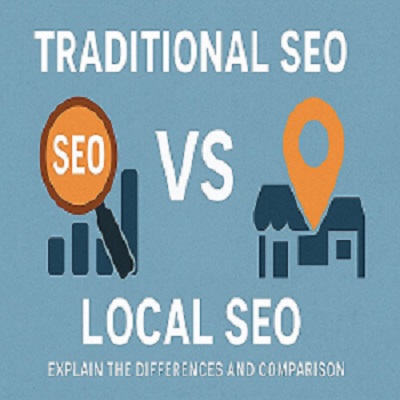


Traditional SEO boosts global online visibility, while Local SEO targets nearby audiences.
The Digital Marketing world is growing rapidly, and search engine optimization works as a strong pillar. But not all SEO strategies produce the same results. If your business wants to grow online, it’s very important to understand the difference between traditional SEO and local SEO.
The goal of both is the same to enhance your visibility in search engine results. But the approach and target audience are both different. This article is going to explain the main differences between the two types of SEO, so you can decide which strategy will be best for your business.
Traditional SEO
Traditional SEO, sometimes called “organic” or “national” SEO, you can use it for improving your website’s visibility to a wide and non-location-specific audience.
Its goal is to get your site to rank higher in Search Engine Results Pages (SERPs) for less generic keywords and phrases that are related to your products or services—no matter where the user is searching from, location doesn’t matter.
1. Broad Keyword Research
Find generic keywords and phrases related to the industry or content that do not mention any location. Example: “best smartphones”, “digital marketing tips”, “how to write a resume”. These keywords target a wide audience, which can increase your visibility nationally or globally.
2. High-Quality Content Creation
Create blogs, articles, guides and videos that answer users’ questions correctly. This makes the Content valuable and engaging, which helps you to builds your authority and show up on Google.
Simple formula: Write well and always write for the benefit of the audience.
3. Link Building
Getting backlinks from good and trusted websites is a strong signal of SEO. These backlinks act as a “vote of confidence” – it shows to search engines that your content is reliable and focus on natural and relevant links.
4. Technical SEO
The structure of the website should be good, the page load quickly, it looks good on mobile, and it should be secure. If Google is not able to crawl your site properly, then no matter how good the content is – it will not rank.
Local SEO
Local SEO is a strategy that specifically brings your business to local customers. When users search “near me” or specific city/town’s name such as “best dentist in Gurgaon” or “salon near me,” then local SEO ensure that your business comes on top of that result.
Key Strategies in Local SEO
1. Google Business Profile (GBP)
The base of local SEO is your Google Business Profile. You should hold your GBP listing and accurately update all important details – such as business name, address, phone number (NAP), timings, services, and photos. Posting regularly is beneficial. When your profile is fully optimized, you will appear prominently in the “Local Pack” and Google Maps results.
2. Local Keyword Targeting
The keywords used in local SEO should be location specific. You should choose keywords that combine a geographic term with your service, such as “plumber in Gurgaon,” “bakery near me,” or “best gym Delhi.” These types of keywords show local intent and put you in front of people who are looking for nearby solutions.
3. Local Citations
Your business should be listed in multiple online directories – such as Yelp, Yellow Pages, and industry-specific platforms. Your NAP (Name, Address, Phone Number) should be the same and accurate everywhere. If information is mismatched in different places, search engines get confused and your local ranking can go down.
4. Online Reviews and Reputation Management
Customer reviews are a strong signal for local search ranking. You should actively seek reviews from your satisfied customers – especially on your Google Business Profile. All reviews – whether positive or negative – should be responded to. Good reviews not only increase ranking but also gain trust from new customers.
| Factor | Local SEO | Traditional SEO |
| Target Audience | It targets local customers in a specific area. | Targets national or global audience |
| Keywords | Geo-targeted keywords (e.g., “salon in Jeddah”) | Generic keywords (e.g., “best hair care tips”) |
| Ranking Factors | Google Business Profile, NAP (Name, Address, Phone), local reviews | Website quality, backlinks, content optimization |
| SERP Features | Map Pack (Google Maps listings), Local Listings | Organic search results (blogs, product pages, etc.) |
Conclusion:
When you are targeting local customers, local SEO is the perfect choice, and if you are focusing on global audience, then traditional SEO is best. The goal of both same that enhance visibility, but the strategy is different. Before choosing, keep the target clear and apply SEO smartly, only then will you get real results.
